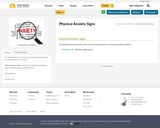
The following resource includes a list of physical warning signs for anxiety along with a website.
- Subject:
- Health & Fitness
- Health Education
- Material Type:
- Activity/Lab
- Assessment
- Date Added:
- 11/09/2018

The following resource includes a list of physical warning signs for anxiety along with a website.
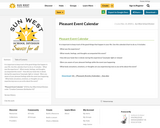
It is important to keep track of the good things that happen in your life. Use this calendar/chart to do so. It includes:
- What was the experience?
- What moods, feelings, and thoughts accompanied this event?
- How did your body feel, in detail, during this experience? (example: light or relaxed
- Were you aware of your pleasant feelings while the event was happening
- What body sensations, emotions, or thoughts are you experiencing now as you write about the event?

"Conversations that unlock the deeply human part of who we are, so that we can live, love, parent, and lead with more courage and heart."
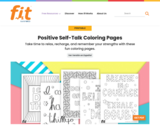
Take time to relax, recharge, and remember your strengths with these fun coloring pages.
Sayings include: I Believe in Me, Breath in Courage Exhale Doubt, I Can Do Hard Things, Don't Give Up! I Can Do This!, It's All Going to be Okay
Check out the great connected lessons that accompany the coloring pages, as well as many other resources.
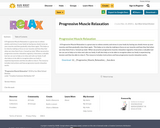
A Progressive Muscle Relaxation is a great way to relieve anxiety and stress in your body by having you slowly tense up your muscles and then gradually relax them again. This helps us to relax by making us focus on our muscles and how they feel when we relax them from a ‘tensed up state.’ When we practice progressive muscles relaxation regularly, it becomes a valuable tool we can use to help us to relax and calm our body. It will also help us to be able to recognize when our body is experiencing tension and then be able to relax it. The resource includes instructions and how progressive muscle relaxation works.

Follow the link to the Google Play or Apple Store to download the Release App for Mindfulness. This app was created by Keynote Speaker Trinna Markusson at iLearn & SWTA for 2020.
"This new wellness app incorporates mindfulness and tapping techniques to help empower you to begin to deal with daily stress, difficult emotions and limiting beliefs that can hold you back from living your best life! With categories for adults, teens, kids, classroom use and a special high-performance category for athletes, Release can help you to stay present and to live with more peace and ease."
For more information visit (copy and paste into a browser) - http://www.presentmomentliving.ca/

Resources are available for:
*Homework and learning with technology
*Online privacy and safety
*Social media and devices
*Cyberbullying
*Media balance and well-being

Videos & Discussion Guides Available.
The Pan-Canadian Joint Consortium for School Health (JCSH) worked with The Students Commission of Canada to develop a set of videos and resources on preventing youth substance use harms using a positive youth development approach. The multi-media assets consisted of three videos: one for youth in Grades 6 to 8, one for youth in Grades 9 to 12, and one for adult allies and educators. Disseminating and integrating the latest evidence and initiatives on the prevention and reduction of substance-related harms in youth, each of the videos was developed in English and in French, with subtitles; companion resources include a discussion guide and a resources list.

Great ideas to take care of yourself!
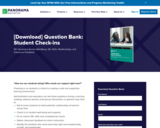
"How are our students doing? Who needs our support right now?"
This year, checking in on students frequently and consistently is even more critical to creating a safe and supportive learning environment.
Administrators and educators can these questions during a morning meeting, advisory period, small group intervention, or general class time to:
Check in on student well-being and supports
Do an interim SEL skills and competencies check
Gather classroom feedback to inform instruction
Identify the students who need extra help right now academically, socially, and emotionally
In This Guide, You'll Get Access to:
✔ Panorama's full check-ins question bank (includes 80+ free response and multiple choice questions for grades 3-12)
✔ Recommendations on who should use the questions, how often to send check-ins, and how to take action on the data
✔ An overview of Panorama's new student check-ins tool, which is a companion to annual SEL and school climate measurement "
You will need to provide your information to download the guide.

Saskatchewan's Action Plan to Address Bullying and Cyberbullying is the roadmap that guides the government's work to end bullying. More than 1,000 students, teachers, parents and community members throughout our province contributed to the plan by sharing their thoughts about the effects of bullying.
Bullying can be:
-Verbal: usually involving taunts, name-calling, put-downs, slurs, offensive gestures, incessant mocking, threats, intimidation, and laughing at someone else’s expense;
-Social: excluding, ganging up, ridiculing, gossiping, spreading rumours, extortion or stealing of money and possessions;
-Physical: involving physical harm often from kicking, punching, hair pulling, pinching, and pushing;
-Sexual: involving unwanted physical contact or sexually inappropriate comments; and
-Cyber: using a computer or other technology to forward or spread hurtful messages and/or images.
Whatever form bullying takes, it is not “just something kids have to go through”. It needs to be reported and addressed.
Resource includes more information on getting help with bullying, prevention and more resources are included.

Call HealthLine at 811 for professional health advice or mental health support.
Open 24/7
Confidential
Free
Translation in over 100 languages
What is HealthLine 811?
HealthLine is a confidential, 24-hour health information and support telephone line. It is staffed by experienced and specially trained Client Navigators, Registered Nurses, Registered Psychiatric Nurses, and Social Workers.
HealthLine is free. Services are offered in English, with translation available in over 100 languages.
If you are having technical issues with accessing HealthLine by dialling 811, you can call 1-877-800-0002 to be connected with HealthLine.
Deaf and hard of hearing residents can access HealthLine by using the SaskTel Relay Operator service at
1-800-855-1155.
How does HealthLine work?
When you call 811, a licensed healthcare professional will give you options and information to help you with health-related questions or concerns. You will be able to discuss your concerns in a safe, caring, and confidential manner.
A registered nurse will assess your symptoms and help you decide whether to treat your own symptoms, go to a clinic, see your primary health care provider, or access emergency medical care, if necessary.
HealthLine also provides mental health and addictions support. HealthLine’s registered Psychiatric Nurses and Social workers can offer advice to help you manage your situation, or give you information about resources in your community.
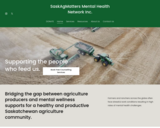
SaskAgMatters is a local support network that provides mental wellness resources to those in the agriculture community. This link is for their main website. It also includes several additional mental health resources available in Saskatchewan. This resource works well when discussing specific mental health supports available for those in agriculture.
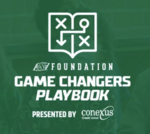
Game Changers Playbook is made for educators and students to address mental health and well-being in our schools and communities. The playbook is a collection of ministry reviewed mental health resources that are evidence-based and curriculum linked. Resources provided in the playbook are manageable, user-friendly and connect to actions within the Provincial Education Plan’s Mental Health and Well-being priority.
The Ministry of Education and the Saskatchewan Roughrider Foundation have partnered again this off season to provide the Game Changers Playbook to educators and students. The playbook is a collection of ministry reviewed mental health resources that are evidence-based and curriculum linked. Resources provided in the playbook are manageable, user-friendly and connect to actions within the Provincial Education Plan’s Mental Health and Well-being priority.
Together with the Foundation, the following leading youth mental wellness organizations are providing resources to all schools in the province for no cost. Schools can book a session with one or more of the organizations listed below or apply for a youth grant through the Game Changers Playbook web page.
*Saskatchewan Roughrider Foundation – Win With Wellness Player Presentation Series
*Strong Kids Strong Minds, Psychology Canada – Kids Have Stress Too! and Stress Lessons
*Kids Help Phone – Counsellor in the Classroom
*SaskTel – Be Kind Online Youth Grant
Also available for registration is the Rider Reading Program which brings player ambassadors into Saskatchewan schools to promote literacy and positive feelings towards daily reading.
Contact: marnie.forsberg@saskriders.com

"The Science of Happiness is a free online course that explores the roots of a happy and meaningful life. Students engage with some of the most provocative and practical lessons from this science, discovering how cutting-edge research can be applied to their own lives.
Since it first launched in September of 2014, The Science of Happiness has been hugely popular: It is one of the top 10 courses on the edX platform, where it is hosted; more than 500,000 students have registered for it so far; and students who complete the course report significant increases in their happiness and decreases in their levels of stress and loneliness."
You will have to register to take this free online course!

A recent survey found that 37% of teens say they have poor mental health.
This 6-week course aims to curb this mental health crisis by bringing together the best insights from Dr. Laurie Santos’ popular Yale course Psychology and the Good Life.
In this course, you will explore what the field of psychology teaches us about how to be happier, how to feel less stressed, and how to thrive in high school and beyond. The lessons along with short weekly ‘happiness homework’ assignments will ultimately prepare you to put these scientific findings into practice. The ultimate goal is for you to feel better and build healthier habits.
Parents, teachers, and other professionals supporting teenagers may also find the course beneficial.

"A library full of free tips, videos, and more to help you get through the school year. Check it out!"

Self-compassion involves being aware of our own pain and suffering, and understanding that this is a hard, but normal human experience. Directing feelings of kindness and care towards ourselves, and focusing our attention and energy on how we might alleviate our pain, are also crucial components of self-compassion. Self-compassion can bring great benefits for our mental health and well-being. Particularly, self-compassion can activate our soothe system, which calms the threat and drive systems. Our threat and drive systems tend to be overactive for many of us much of the time, and responsible for the difficult emotions we may be struggling with (e.g., anxiety, anger, depression). The opposite of self-compassion is self-criticism. This very negative thinking style often links to difficult emotions and mental health problems. Those who are highly self-critical particularly need to develop the ability to relate to themselves in a compassionate way.

GOAL: Experience the self-compassion that naturally exists within you & consider how you care for yourself each day.

Low self-esteem is having a generally negative overall opinion of oneself, judging or evaluating oneself negatively, and placing a general negative value on oneself as a person. People with low self-esteem usually have deep-seated, basic, negative beliefs about themselves and the kind of person they are. These beliefs are often taken as facts or truths about their identity, rather than being recognised as opinions they hold about themselves. It is important to know that low self-esteem is a common problem for many people in our society – so you are not alone. Low self-esteem can occur as part of a current problem (such as depression), or as a result of other problems (such as chronic illness, relationship problems) or it can be a problem in itself. Either way, the good news is that you can take steps towards developing more healthy self-esteem.
**Website includes worksheets, workbooks and information sheet on self-esteem.